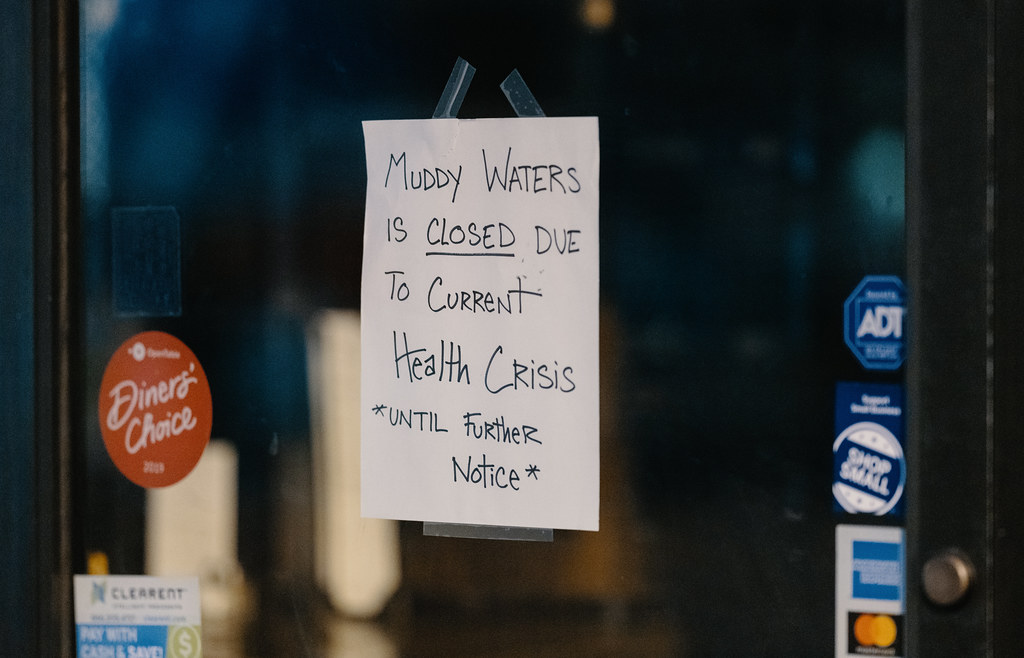The Dormant Commerce Clause Can’t Override State and Local Lockdowns
Attorney General William Barr’s suggestion that state and local pandemic policies violate the dormant Commerce Clause rings hollow.

Published by The Lawfare Institute
in Cooperation With

As President Trump grows increasingly impatient to reopen the U.S. economy in the face of an approaching election, Attorney General William Barr has begun suggesting that those restrictions may violate the Constitution.
The claim is odd, because Barr does not cite any evidence of states doing anything other than following the Centers for Disease Control and Prevention’s guidance—or evidence that states meet the administration’s own criteria for “reopening” under that guidance. But Barr nonetheless called states’ restrictions “draconian.” As he revealed in a recent interview, if the Department of Justice determines that governors have imposed “blunt,” overbroad restrictions that violate the Constitution, including the dormant Commerce Clause, the department will “initially try to jawbone the governors into rolling them back or adjusting them. And if they’re not and people bring lawsuits, we file [a] statement of interest and side with the plaintiffs.” In an April 27 memo, Barr announced that the Department of Justice would “monitor state and local policies” aimed at stopping the spread of the novel coronavirus “and, if necessary, take action to correct them.”
It’s not entirely clear what message Barr was trying to convey, given that the president himself has criticized the precipitous relaxation of lockdown requirements in Georgia. Barr did not offer any examples of states behaving unconstitutionally, so it’s possible that his comments and the memo were all part of the administration’s mixed messaging—which demands strong social distancing measures and quick opening all at the same time.
Moreover, it may well be the case that some broad state and local coronavirus restrictions do overstep the Constitution’s bounds in some respects. For instance, the California Highway Patrol recently banned all protests on state property indefinitely. As my organization, Protect Democracy, explained in a letter to the state, unless California provides a compelling explanation for why such a broad ban is permissible, that ban may well run afoul of the First Amendment’s protection for political protests in traditional public fora.
But as long as the pandemic’s public health exigencies persist, Barr’s suggestion that state lockdowns violate the dormant Commerce Clause rings hollow. The dormant Commerce Clause is not actually a clause of the Constitution. Rather, it is a long-standing doctrine created by the Supreme Court that acts as a corollary to the power granted to Congress to regulate interstate commerce. The dormant commerce doctrine imposes a limit on states’ ability to regulate interstate commerce even where Congress has not actually spoken. Specifically, this means that “[f]irst, regulations may not discriminate against interstate commerce; and second, States may not impose undue burdens on interstate commerce.” As Robert Chesney has noted in Lawfare, shelter-in-place orders do not raise “a ‘discrimination’ scenario.” Rather, the question is whether these restrictive orders unconstitutionally burden interstate commerce.
“State laws that regulate even-handedly to effectuate a legitimate local public interest will be upheld unless the burden imposed on such commerce is clearly excessive in relation to the putative local benefits,” the Supreme Court has long acknowledged. When courts weigh whether public health and safety regulations impose an undue burden on national commerce, “it must be borne in mind that the Constitution when conferring upon Congress the regulation of commerce, never intended to cut the States off from legislating on all subjects relating to the health, life, and safety of their citizens.” As my colleagues have written previously, and as the Supreme Court’s dormant Commerce Clause cases recognize, health and safety regulations are “primarily, and historically, a matter of local concern.”
The shelter-in-place orders currently in force should easily withstand a challenge in court. As Barr himself has stated, “states have very broad police powers” over the health and safety of their residents; importantly, the power to phase out shelter-in-place and other social-distancing measures lies with governors. And while the Constitution empowers Congress to “regulate commerce ... among the several states,” the Commerce Clause hardly provides the federal government the authority to quash restrictive measures for having some impact on the national economy. Instead, courts will likely uphold states’ and localities’ protective coronavirus restrictions so long as their benefits to residents’ health and safety don’t “clearly excessive[ly]” burden the flow of commerce between states.
Over a century ago, the Supreme Court made clear “[t]hat until Congress has exercised its power on the subject, ... state quarantine laws and state laws for the purpose of preventing, eradicating, or controlling the spread of contagious or infectious diseases, are not repugnant to the Constitution of the United States, although their operation affects interstate or foreign commerce.” Upholding the constitutionality of a Louisiana quarantine law, the Supreme Court clarified that as distinct from an “attempted exercise by the state of the power to absolutely prohibit the introduction of an article of commerce” into its borders, states have “the power to regulate by health laws the subjects of legitimate commerce,” notwithstanding an incidental impact on the national marketplace
Even if the issue were not settled, the dormant Commerce Clause’s burdensomeness balancing test tilts sharply in states’ and localities’ favor. As COVID-19 cases and death tolls keep climbing, physical distancing remains the country’s best defense against the coronavirus—especially with a vaccine likely many months away. The Trump administration’s own guidance agrees. Sustained distancing is the surest way to serve “legitimate local public interest[s]” in saving lives, ensuring that health care facilities can operate safely, and securing a healthy economy in the long run.
To be sure, the economic cost of these movement restrictions is profound. But, as Justice Sandra Day O’Connor pointed out, courts also “generally defer[] to health and safety regulations because their burden usually falls on local economic interests as well as other States’ economic interests, thus ensuring that a State’s own political processes will serve as a check against unduly burdensome regulations.” And indeed, even in the hardest-hit states, governors have announced plans to reopen some businesses in the next few weeks. On balance, then, courts would be hard-pressed to find that the current burden of distancing orders on interstate commerce “is clearly excessive in relation to the putative local benefits.”
Despite a likely failure to succeed, however, private individuals and businesses might well bring dormant Commerce Clause challenges against social-distancing mandates in court. And Barr seems determined to throw the weight of the Justice Department behind those lawsuits.
No doubt, the attorney general enjoys broad authority “to attend to any ... interest of the United States.” But it would raise grave concerns if the Justice Department were to plant a flag on the side of plaintiffs whose desired outcomes align with the president’s rhetoric—though not administration policy—but whose legal positions couldn’t hold up against binding precedent. Barr’s suggestion that the federal government would “jawbone” state and local leaders who don’t accede to Trump’s demands to lift restrictions is even more concerning, as states’ and localities’ reliance on the federal government for support amid the current crisis gives it immense power to influence local decision-making.
Barr’s threat of legal action shows inadequate respect for the established authority of states and localities over the health, safety, and welfare of their citizens and may signal yet another push to politicize the Justice Department’s work. But whether by jawboning, suing, or filing a statement of interest, Barr can’t successfully browbeat states and localities into easing their coronavirus restrictions on the president’s preferred timeline. If the Department of Justice muscles this political fight between Trump and his opponents into court, it will most likely fail. The law is on the side of state and local governments on this one.
Disclosure: The author works for Protect Democracy, which has represented Lawfare editors Benjamin Wittes, Jack Goldsmith, Scott Anderson and Susan Hennessey on a number of separate matters.



.jpg?sfvrsn=8588c21_5)
-final.png?sfvrsn=b70826ae_3)
